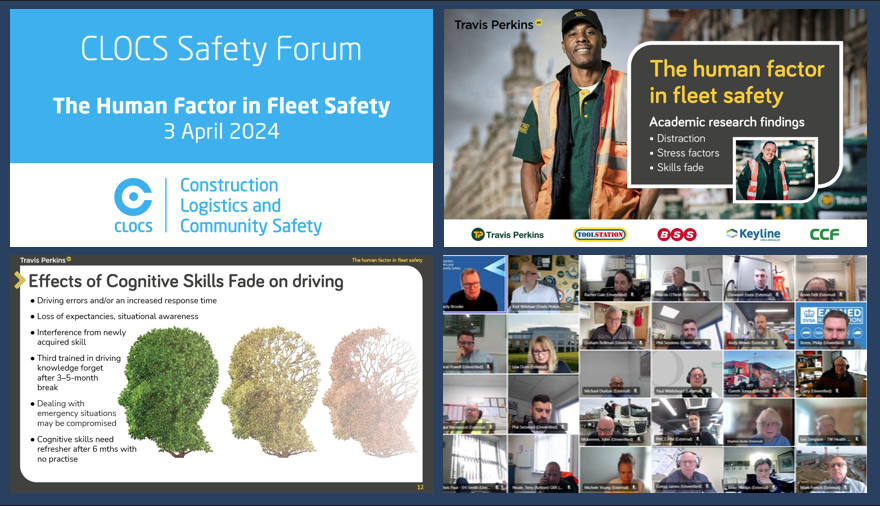
The principal aim of CLOCS is zero fatalities or serious injuries from construction related vehicle movements and a key part of achieving that aim is understanding the underlying causes for such incidents.
While much work has been done across the industry to ensure that the vehicles that move our materials from A to B are as safe as possible, what do we do to ensure those driving our vehicles are equally prepared?
In this latest CLOCS Safety Forum, Karl Wilshaw, Fleet Director for Travis Perkins and Dr Lisa Dorn, Associate Professor of Driver Behaviour at Cranfield University and Founder of PsyDrive discussed the human factor in fleet safety.
Travis Perkins plc is the UK’s largest distributor of building materials and a leading partner to the construction industry. As part of the Group’s commitment to continuous improvement, the business commissioned a study which involved a comprehensive literature review of existing human factors research to investigate ways of improving fleet safety.
The research project spanning across two years, conducted by Dr Lisa Dorn, concluded that without regular practice, people experience skill decay, and cognitive skills such as decision-making are particularly vulnerable. Understanding the basic neuroanatomy involved is key.
Our brain has evolved from the reptilian brain governing instincts, the mammalian brain controlling emotions, and a rational brain managing thinking and planning. The frontal lobe of the cerebral cortex is crucial for planning and control and plays a pivotal role in decision making when driving. However, driving for work can be stressful with excessive demands on drivers, coupled with low decision-making control, increased workload, exhaustion, and difficulties in unwinding after work. Stress can overload our limited cognitive resources. Drivers may find it challenging to process road-related information as attention shifts to emotional processing diverting focus away from safety-relevant information. This talk discusses the implications of this research for improving fleet safety.
A copy of the report issued following this research can be accessed here and a copy of the presentation can be accessed here. Additionally, the session was recorded and a link shared with members after the event.
With regards PsyDrive, Lisa is on a mission to up-skill fleet safety managers on human factors and would welcome the opportunity to engage with more fleet operators. A flyer is available which introduces the Human Factors and Road Risk Management programme. You can visit PsyDrive for more information.
Looking forward
Every fleet operator should be considering the steps they take to ensure the wellbeing and road worthiness of their drivers. Are you considering time away from the wheel and the effects of this on their competency? Are you aware of what is going on in their lives and thinking about the possible impact this might have on their ability to drive safely without distraction?
Please share this information across your organisations to ensure everyone is thinking about these issues and are looking out for signs that could help them take the appropriate steps.
And finally…
Our thanks to Karl and Lisa for giving up their time to share the details of their research and their knowledge and insights on this subject with the CLOCS community, and thanks also those who attended sharing their own thoughts and experiences.
The voice of our members is vital to the success of CLOCS so please contact the team if you have any queries, suggestions or concerns about any aspect of CLOCS.
CLOCS needs you
These Safety Forums are designed to support and inform CLOCS members so please do let us know if you have any suggestions for future topics or whether you, or someone you know, would want to come along to a future Forum and share their expertise on a particular topic.
If you can think or anything or anyone, please contact Andy Brooke at andy.brooke@secbe.org.uk.


